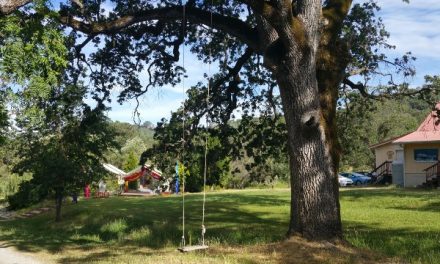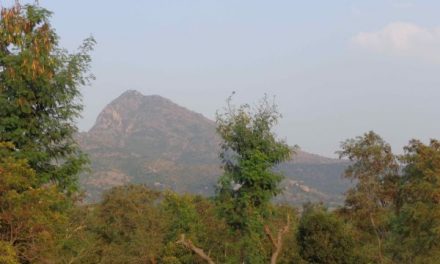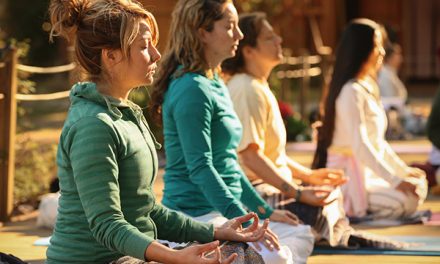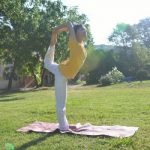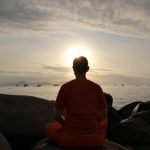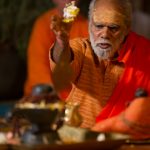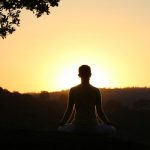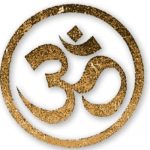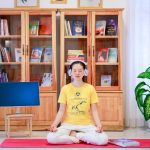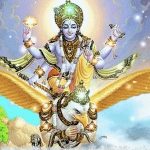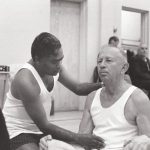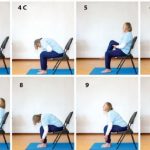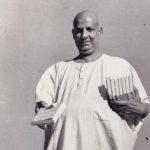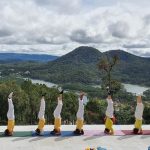Meditation and the Self
When the surface of a lake is still you can see the bottom very clearly, but it is impossible to do so when the surface is agitated by waves. In the same way, when the mind is still with no desires and no thought waves you can see your Self. That is called Yoga.

We often hear about meditation, but you must understand that it can take many years to grasp its true nature. Can anyone teach you meditation? No. In fact, no one can teach you meditation, just as no one can teach you how to sleep. Can anyone teach you how to sleep?
You can prepare a king-size bed; you can have a nice air conditioned room; you can avoid all the things which disturb sleep, but that’s all you can do. Sleep itself is not in anyone’s hands; you fall into sleep. In the same way, meditation comes by itself through a process of extended concentration.
I asked you just now to observe two minutes silence. What happened during that two minutes? The moment I asked you to keep silence, your mind became unsteady, no? One part of the mind wanted to enter into a silent state, but without your knowledge or cooperation another part actually took you away from the silence.
Learn to watch the mind
In meditation we learn to watch the mind and the mind’s mental modifications, its thoughts. You can watch the play of the mind just like you watch television. There are so many channels to watch. How many channels do you have in your mind? An infinite number no doubt. There is a difference between a sage watching the mind and ourselves trying to watch the mind—we become part and parcel of the play of the mind, we identify with the mind and its thoughts, whereas a sage becomes a witness to the mind, he knows that it is just a play, existing independently of his own Self.
It’s like watching a movie. When we watch a scary movie, what happens to us? We get scared. Why? Is the movie real? No. It’s just a play of light and colour. But we identify with the movie, and we get scared. Now if we identify with the movie, what are we actually doing? I will tell you. We are forgetting our own identity, no? If you are aware that you are watching a movie, that it is just a movie, then you will not be affected by it. You are only affected when you identify with what is going on in the movie. That’s all. Now, in a similar way, the whole process of meditation is this—that you learn to identify with your true SELF, not with the play of the mind. Most of us do not identify with this Self which is independent of the mind, and so we become part and parcel of the play of the mind and we suffer.
What is this I?
“I am the great Swami Vishnudevananda, founder-director of the Yoga Camp!!!” I act. Not only do I act, I feel and become identical with the particular part I am playing. And each one of us is playing a part. Maybe you are in business, maybe a doctor, professor, musician, artist, lawyer, politician, electrician, mother, daughter, and so on. We’re all playing parts and we’ve forgotten our real nature, who we really are. Suppose an actor is playing the part of a king on stage. He sits on a big throne with attendants and guards sitting nearby. He has a big sword in his hand, and he commands: “Take him away and lock him up!” Well, kings are that way.
In his ordinary life he is just an ordinary man, but on stage, he has to lose this identity to a certain extent in order to play the part of the king. Now, suppose he forgets his former identity and thinks from that moment on that he really is the king, even after the play is over. Then what would we call him? Crazy. Well, we are like the crazy actor. We are all playing a part and identifying with it. A woman plays the role of a loving mother, and she suffers. I play the role of a yogi, and I suffer. We all suffer, because we are not identifying with our real nature. We are mistaken in believing that the roles that we are playing are our real Self. The purpose of meditation is to learn to detach from these roles and identify only with the true SELF.
If you taste the bliss of meditation even for a moment, you will feel that all life which is not meditation is a waste. In daily life you allow this wonderful inner divine power, the power of consciousness which is reflected in your mind, flow out and illumine the objects of the world. All the pleasure that you get from worldly objects is the pleasure that is inherent in this consciousness. And, yet, deluded, we feel that the pleasure we derive comes from the objects themselves. This waste of consciousness and power goes on unhindered. One day, if you shut out all thoughts, if you re-direct all the rays of the mind inward, if you rest in your own true Self, then you will know what a fountain of power and bliss lies within you. Then will you yearn for more and more; you will feel that even a moment spent in letting this consciousness flow outward is pain and pain alone.
Brahmamuhurtha
Practice concentration in brahmamuhurtha (between 4am and 6am). The world is at peace; it will be easier for you to collect the rays of the mind and concentrate on the Self within. Sit in padmasana or siddhasana in a secluded place. Pray to the Lord and your teacher to bless you. Do japa (mantra repetition). Japa is the only staff you can safely lean on as you enter the realm of concentration.
The breath will become rhythmic and calm. If negative thoughts arise in the mind, ignore them; do not identify or fight with them. They will pass away. Concentration will then deepen into meditation, and you will feel the divinity within you in all its glory. Samadhi will follow.

